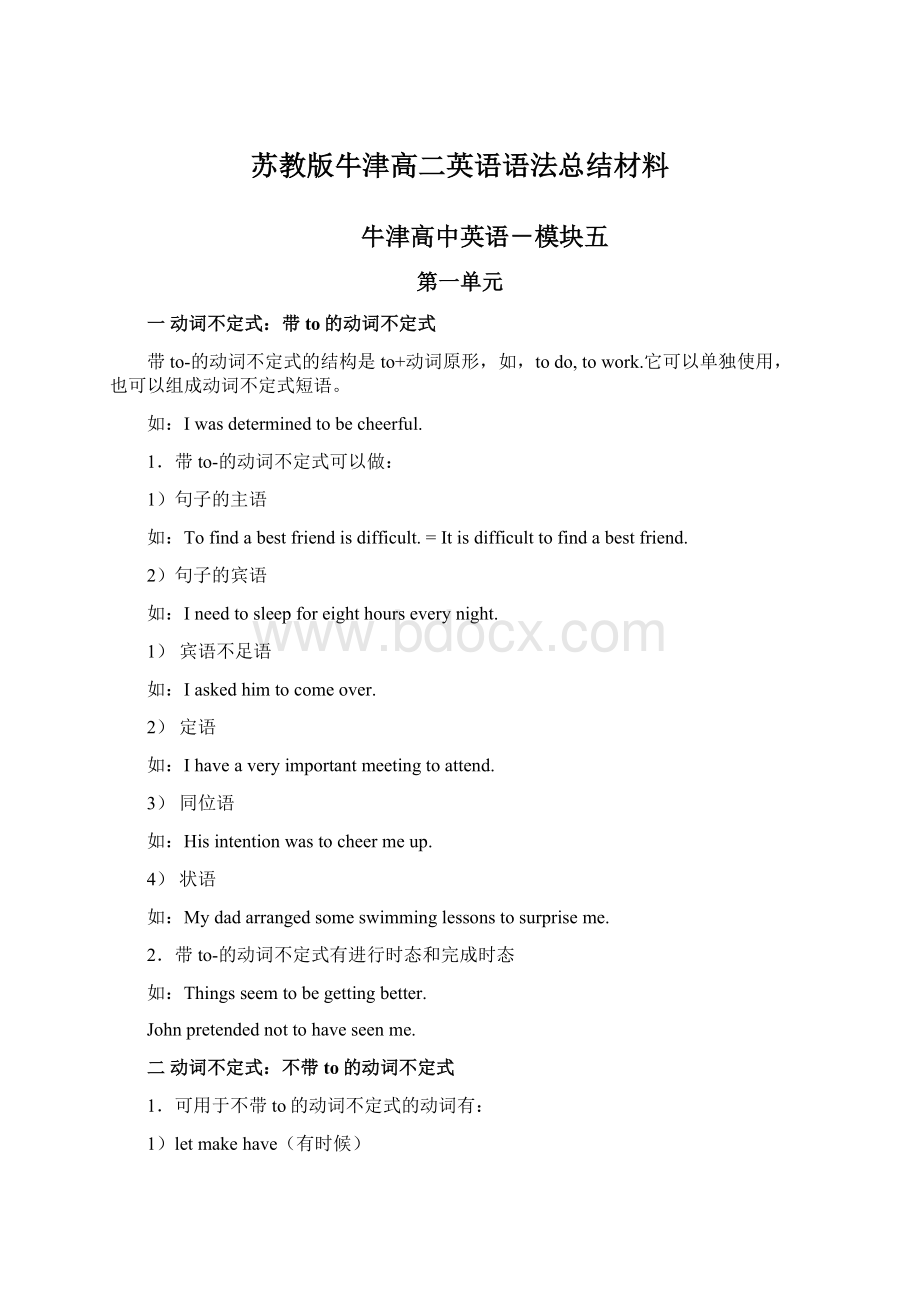苏教版牛津高二英语语法总结材料Word文档下载推荐.docx
《苏教版牛津高二英语语法总结材料Word文档下载推荐.docx》由会员分享,可在线阅读,更多相关《苏教版牛津高二英语语法总结材料Word文档下载推荐.docx(22页珍藏版)》请在冰豆网上搜索。

二动词不定式:
不带to的动词不定式
1.可用于不带to的动词不定式的动词有:
1)letmakehave(有时候)
Iletherborrowmybook.
Shemademepromisetowriteeveryday.
Theteacheroftenhashisstudentsreadaloudinclass.
2)感官动词:
feelhearseewatch
Isawhertalktohernewfriends.
3)wouldratherhadbetterwhynot
Iwouldrathergoswimming.
Youhadbettertidyyourbedroom
WhynotvisityourcousininJapan?
注:
感官动词后可以接v-ing
Isawhertalktohernewfriend.(见证谈话的整个过程)
Isawhertalkingtohernewfriend.(见证谈话正在发生,但不一定见证整个谈话过程)
2.当有and,or,except,but,than,ratherthan,连接两个动词不定式时,后一个不定式往往省略to。
Shetoldmetobecheerfulandlookonthebrightside.
Doyouwanttogoshoppingorwatchafilm?
WehadnothingtodobutwatchTV?
Idecidedtowriteratherthanphone.
三V-ing作名词
1.V-ing可以充当名词用。
可以被用做:
1)做主语(指一般性的动作)
Swimmingisgoodforyourhealth.
2)做宾语(指一般性的动作)
Iloveswimmingintheseaduringthesummer.
3)介词之后
Ikeepfitbyswimmingeveryday.
4)物主代词之后
Herswimminghasimprovedsinceshestartedtrainingeveryday.
如果所谈论的人比较明确,那么物主代词可以省略。
Thankyouforcoming.
5)组成复合名词
Thereisashoeintheswimmingpool.
2.以下动词后面接v-ing
Admitdislikeimaginedelayconsidermindunderstandavoidenjoypracticemissfinishkeepsuggest
3.以下常用词组后面接v-ing
Wouldyoumindcannothelplookforwardtofeellikecannotstanditisnouse/goodputoffkeepon
Wouldyoumindhelpingmewithmyhomework?
Icannothelpwonderingwhyshedoesnotlikeme.
Ilookforwardtoseeingyouattheparty.
Idon’tfeellikedoinganythingnow.
Shecannotstandseeingthatboy.
Ithinkitisnousecryingaboutyourexamresultsnow.
Ihadtoputoffshoppingforawhile.
Hekeptonaskingmeformyphonenumber.
4.以下动词后面可以接v-ing或todo,意思上几乎没有区别。
Continuepreferbeginhatelikestart
5.一些动词后面既可以接v-ing,也可以接todo,但意义和用法上有区别。
在使用时要确保形式的正确。
如,forgetregretremembermeantrygoon
forget+todo(事情还没做)
Heforgottoclosethedoorwhenheleft.
Forget+doing(事情已经做了)
I’llneverforgetwinningmyfirstgoldmedal.
第二单元
一V-ing充当形容词或副词
1.v-ing可作:
1)定语
v-ing可以放在名词前,像形容词一样修饰名词。
Thiswillhavealastingeffect.
有时候会把一个副词放在v-ing前。
Thatwasanextremelyinterestingspeech.
v-ing可以和副词或名词构成复合词。
Thefast-growingeconomyhascausedenvironmentalproblems.
Awood-burningstoveisenvironmentallyfriendly.
v-ing可以放在名词后,像定语从句一样修饰名词,v-ing还可以被改成定语从句。
peoplerunningthesefactoriesareveryconcernedabouttheenvironment.=
Peoplewhorunthesefactoriesareveryconcernedabouttheenvironment.
2)表语
Thisdestructionisfrightening.
1)宾语补足语
Weallfoundhisargumentconvincingandinteresting.
2.v-ing可放在stand,sit,lie的后面,表示动作同时发生。
Theystoodtalkingtoeachother.=Theystoodwhentheyweretalkingtoeachother.
3.v-ing有完成时态,如,havingworked
Havingworkedsidebysidewithmanyenvironmentalists,Iknowthatahealthyenvironmentandstableeconomyshouldbepossibleatthesametime.
二V-ing短语
v-ing短语可以单独使用,后面也可以接宾语或状语。
Theysattheresmiling.
Theysattheresmilingateachother.
1.v-ing短语可以表示:
1)时间
Askingaround,Ifindmanypeoplewillingtopayslightlyhigherpricesforthingsthatareenvironmentallyfriendly.=WhenIaskaround,Ifindmanypeoplewillingtopayslightlyhigherpricesforthingsthatareenvironmentallyfriendly.
Havingobservedtheproblemformanyyears,heannouncedthatwearenowfacingthebiggestenvironmentalproblemofourtime.=Afterheobservedtheproblemformanyyears,heannouncedthatwearenowfacingthebiggestenvironmentalproblemofourtime.
2)原因
Wearemakingbiggerholesinthenets,hopingtoavoidcatchingfishthatarenotfullygrown.=Wearemakingbiggerholesinthenets,becausewehopetoavoidcatchingfishthatarenotfullygrown.
3)结果
Thefactorykeepsreleasingsmoke,makingtheairdirty.=Thefactorykeepsreleasingsmoke.Asaresult,theairismadedirty.
4)条件
Preparingfully,wecanachievegreatthings.=Ifwepreparefully,wecanachievegreatthings.
2.连词+v-ing也可以来表示时间。
常用的连词有:
whenwheneverwhileonceuntil
Wehavetotakeenvironmentalprotectionintoconsiderationwhendevelopingtheeconomy.
3.v-ing从句的逻辑主语通常和主句的主语一致。
Hetraveledontheplanelikethis,keepingthetortoiseinablanket.=Whenhetraveledontheplanelikethis,hekeptthetortoisehiddeninablanket.
4.否定形式是:
not+v-ing
Hesatthere,notknowingwhattosay.
第三单元
一V-ed形式
v-ed在句中可以充当形容词和副词的用法。
1.v-ed可以被用作:
v-ed放在名词的前面,像形容词一样修饰名词。
V-ed可以改成定语从句。
IfIhadthechance,Iwouldhaveaclonedbaby.=ifIhadthechance,Iwouldhaveababywhoiscloned.
大部分名词前的v-ed表达被动的含义。
但有些v-ed表达过去的含义,如,escapedretiredfallen。
比较下面的短语:
表被动:
thehighlypraisedscientist(Thescientisthasbeenhighlypraised.)
表过去:
theretiredscientist(Thescientisthasretired.)
有时候可以把副词放在v-ed之前。
well-trainedteachers
v-ed可以和副词或名词连用构成复合词。
underdevelopedregionhandmadefurniture
v-ed可以像定语从句一样放在名词后修饰名词。
Ithinkthescientificadvancesmentionedinyourarticleareinteresting.=Ithinkthescientificadvancesthatarementionedinyourarticleareinteresting.
MygrandfatherwasdelightedtohearIpassedmyexams.
3)宾语补足语
Aftertherobbery,theyfoundthefrontwindowsbroken.
2.v-ed可以接在动词后面表示动作同时发生。
standsitlie
Shelaytrappedunderthebuildingforthreedays.(Shelaythereandwastrapped.)
二V-ed短语
v-ed短语可以是v-ed单独使用,也可以后面接宾语和/或状语。
Shelefttherestaurant,disappointed.
Shelefttherestaurant,disappointedwiththebadservice.
1.表被动的v-ed短语可以表示:
Thescientisthascopiedahumancell,assistedbyrecentadvancesinmedicalscience.=Thescientisthascopiedahumancell,andatthattimewasassistedbyrecentadvancesinmedicalscience.
Shockedbythearticle,thewomanwrotealettertothenewspaper.=Thewomanwrotealettertothenewspaperbecauseshewasshockedbythearticle.
3)条件
Treatedwithelectricity,thecelltissuewillsplitintoseveralparts.=Ifitistreatedwithelectricity,thecelltissuewillsplitintoseveralparts.
2.v-ed形式有一个逻辑主语。
在上述例子中,逻辑主语都是主句的主语。
thescientistwhowasassistedbyrecentadvancesinmedicalscience
thewomanwhowasshockedbythearticle
thecelltissuewhichistreatedwithelectricity
所有这些主语都跟主句的主语一致。
三V-ed和V-ing都可以做形容词
1.v-ing形式用来描述某人或某物给人造成某种感觉,在意义上通常是主动的。
Inoticedanamazingdifference.
Somepeoplefinditexcitingthattheycouldmakecopiesofthemselvesinthefuture.
2.v-ed形式用来表达我们对某人或某事的感觉,在意义上通常是被动的,因为它表示我们被一个动作所影响。
Iwassurprisedtolearnthattheyhadcopiedahumancell.
Theboywasmorefrightenedthanhurt.
牛津高中英语-模块六
时态的概要1:
现在时态
现在时态可以用来谈论现在的时间,包括一般现在时态,现在进行时态,现在完成时态和现在完成进行时态。
1.我们用一般现在时态来谈论:
1)现在或一直是正确的事情。
Iamatacomedyshow.
Thesunrisesintheeast.
2)经常发生的事情。
TheAcademyAwardsshowisontelevisioneveryyear.
Everytimeapropcomediantellsajoke,heorsheusesathing,calledaprop.
2.我们用现在进行时态来谈论:
1)现在正在发生或正在进行的动作
Theaudienceislaughingatthejoke.
Idon’tunderstandwhyIamnotlosingweight!
2)现在正在被计划,但在将来发生的动作。
TheComedyClubisgivingalectureaboutstand-upnextmonth.
TheyaregoingtotheAcademyAwardsshowinFebruary.
3)重复发生的动作,和always一起使用,通常带有否定的附加含义
Youarealwaysmakingthesamemistakes!
Sueisalwayschanginghermind.
3.我们用现在完成时态来谈论过去和现在是如何联系起来的。
它用于:
1)重复的经历。
Hehashostedtheshoweighttimes.
BillyCrystalhasbeeninmanyfilmsandtelevisionshow.
2)过去发生的事情,但对现在有影响的事情。
Doctorshavefoundthatpeoplewholaughalotlivelonger!
Somestand-upcomedianshavebecomefamousastelevisionandfilmactorslateroninlife.
3)过去开始,但现在仍在发生的事情。
Peoplehavealwaysenjoyedlaughing.
Comedianhavealwaystoldjokesandperformedcomicacts.
4.我们用现在完成进行时态来谈论从过去开始,持续到现在,并且还有可能继续进行的事情。
Doctorshavebeenresearchingthatquestion.
Thecurtainsfinallyopen—theaudiencehavebeenwaitinganhourfortheshowtostart.
时态的概要2:
过去和将来时态
过去时态用来谈论过去的事情,包括一般过去时态,过去进行时态,过去完成时态等。
1.我们用一般过去时态来谈论发生在过去并且现在已经结束的事情。
SangLanwasborninNingbo,Chinain1981.
2.我们用过去进行时态来谈论发生在过去,并且持续了一段时间的事情。
Sheknewthatinthoseyearsshewasmakingherparentsproud.
3.我们用过去完成时态来谈论:
1)在过去的过去发生并且在过去的某一个动作发生之前就已经结束的事情。
Insteadofcryingaboutwhatshehadlost,SangLanthoughtabutwhatshecoulddotogetbetter.
2)在过去的一个动作发生的同时所发生的事情。
BythetimeshecompetedintheNewYorkGoodwillGames,shehadbeenadedicatedjuniorgymnastforelevenyears.
将来的时态用来讨论将来的事情,包括一般将来时态,将来进行时态,过去将来时态等。
1.我们用一般将来时态来讨论将来将要发生的事情。
Shewillcomewithustowatchthefootballmatchtomorrow.
一般将来时态的结构:
1)willshall(用于提供有关将来的信息)
IknowIwillthinkaboutherwhenevermylifefeelsunbearable.
Ishallworkhardandlearntobecomeagymnast.
2)begoingto+do(用于谈论将来的计划和意图)
Today,I’mgoingtotalkabouthowtofindhappiness.
2.我们用将来进行时态来谈论始于将来并且要持续一段时间的动作。
DrBrainwillbetalkingaboutsuccessnexttime.
3.我们用过去将来时态来谈论在过去的时间被提起的时候发生在将来的事情。
BeforeshewenttotheGoodwillGames,SangLantoldherparentsshewasgoingtowinherevent.
非真实条件句
非真实条件句阐述的条件或情况是不真实的或是想象的。
1.我们用非真实条件句来阐述不真实的或想象的一个现在的条件。
IfIgotmarriedintheUSA,Iwouldexpectapresent.
IcouldreachthebookifIwereabittaller.
IfIhadthechance,Imightwanttobeatranslator.
2.我们用非真实条件句